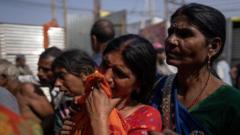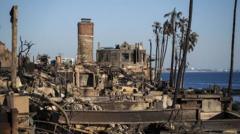Cyclone Chido has left tens of thousands in Mayotte without clean water, leading to curfews to prevent looting. As rescue efforts intensify, fears of rising death tolls and infectious diseases grow amid ongoing humanitarian aid efforts from the French government.
Mayotte Faces Dire Water Shortages and Rising Death Toll Following Cyclone Chido

Mayotte Faces Dire Water Shortages and Rising Death Toll Following Cyclone Chido
Residents of Mayotte struggle with clean water access and a looming humanitarian crisis as cyclone devastation continues to unfold.
Tens of thousands of residents in Mayotte, a French territory in the Indian Ocean, are enduring severe water shortages following the devastating impact of Cyclone Chido. As rescuers continue the search for missing individuals, the situation remains critical, with initial reports from France's interior ministry indicating 22 confirmed deaths; officials caution that this number could climb into the thousands.
Health professionals are raising alarms over the potential for infectious disease outbreaks as many residents face acute shortages of clean drinking water and grocery stores impose rationing on supplies. The French government is scheduled to deliver more aid on Wednesday in response to the desperate conditions.
In a bid to prevent looting amid the chaos, the islanders spent their first night under curfew from 22:00 local time (19:00 GMT) until 04:00, while reports emerged of frantic purchases of water among the population. Many were seen rushing to stores, carrying as much water as they could amid the crisis.
Half of Mayotte is still without electricity, leaving authorities focusing urgently on restoring water treatment facilities. Wednesday's updates from officials hopeful for partial restoration highlighted the ambition to secure water access for as much as 50% of the island's residents by evening.
While the French government has promised to distribute 120 tonnes of food by Wednesday, President Emmanuel Macron's visit to the affected area is anticipated to bolster relief efforts. Mayotte is recognized as one of France's economically challenged territories, often characterized by shanty-town living conditions.
Cyclone Chido, which struck with winds exceeding 225 km/h (140 mph), is the most powerful storm to impact the region in 90 years, completely flattening makeshift shelters and scattering debris across neighborhoods. Witness accounts describe the cyclone's intensity as akin to a "steamroller," emphasizing the scale of destruction.
Local residents are actively involved in recovery efforts, working to cover damaged homes with metal sheets to safeguard against further inclement weather. Mayotte's prefect, Francois-Xavier Bieuville, warned of a rising death toll as damage assessments continue, suggesting that fatalities could number in the hundreds or more due to inaccessible areas.
In addition to Mayotte, Cyclone Chido has wreaked havoc in Mozambique, reporting at least 45 fatalities, and in Malawi, where seven deaths have been confirmed. Over 35,000 people across 20 districts in Malawi have been affected by severe weather.
Experts attribute the increasing strength of such seasonal storms to rising ocean temperatures, posing an ongoing challenge for governments already grappling with political and social issues. The cyclone disaster magnifies the urgency for aid and recovery in a region striving to regain its footing amidst the turmoil.






















